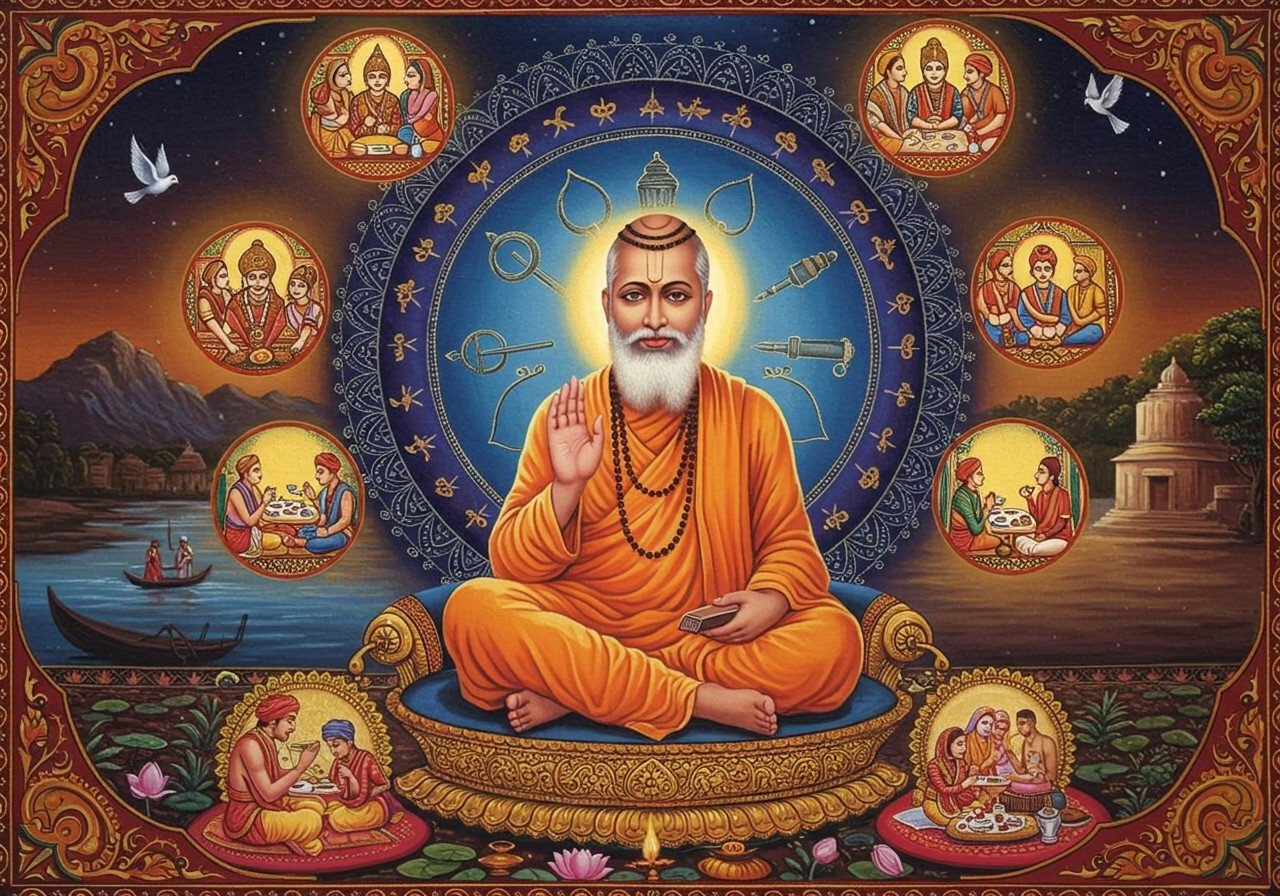
Guru Ravidas Ji, a revered mystic poet-saint and social reformer, illuminated the path towards spiritual enlightenment and social equality in 15th-century India. Born between 1377 and 1450 CE in Sir Gobardhanpur, near Varanasi, his life and teachings continue to inspire millions today. He championed the principles of love, unity, and devotion, leaving an indelible mark on the Bhakti movement.
Early Life and Spiritual Journey
Born to Santokh Dass and Mata Kalsi, Guru Ravidas belonged to a community traditionally associated with leatherwork and considered “untouchable.” His humble beginnings shaped his profound understanding of social injustice and fueled his commitment to equality. He married Lona Devi and they had a son, Vijay Dass. Despite societal barriers, Guru Ravidas dedicated himself to spiritual pursuits. He sought wisdom along the banks of the Ganges, engaging with Sufi saints, ascetics, and sadhus, which broadened his spiritual horizons. This deep immersion in spiritual practices laid the groundwork for his transformative teachings.
Explore a collection of spiritual books and scriptures at poojn.in, including inspiring texts that reflect the spiritual depth of figures like Guru Ravidas.
Challenging Social Norms and Empowering the Marginalized
Guru Ravidas’s teachings transcended societal boundaries, reaching individuals from all walks of life. Meera Bai, a Rajput princess, regarded him as her spiritual mentor, highlighting his influence across social strata. This connection demonstrates the universal appeal of his message of love and devotion. Guru Ravidas fearlessly challenged the prevailing caste system, advocating for a society free from discrimination. His teachings resonated deeply with marginalized communities, offering hope and empowerment. He emphasized the inherent dignity of every individual, irrespective of their social standing.
The Essence of Guru Ravidas’s Teachings
At the heart of Guru Ravidas’s philosophy lies the belief in the unity of all beings and the accessibility of God to everyone. He rejected idol worship, emphasizing the importance of inner purity and devotion through remembrance of God’s name. He promoted a direct connection with the divine, free from ritualistic barriers. Truth, love, compassion, and ethical living formed the cornerstones of his teachings. He stressed the importance of self-realization and inner transformation as the true path to spiritual liberation. Guru Ravidas’s teachings encourage us to live a life guided by honesty, humility, and service to humanity.
Enhance your spiritual practices with pure cotton wicks (batti) for lighting diyas during meditation, available at poojn.in. These wicks symbolize the light of knowledge and devotion, aligning with Guru Ravidas’s emphasis on inner purity and spiritual enlightenment.
Literary Contributions and the Vision of Begumpura
Guru Ravidas expressed his spiritual insights through numerous hymns, verses, and couplets. More than 40 of his compositions are included in the Guru Granth Sahib, the sacred text of Sikhism. Other compilations of his teachings include ‘Ravidas Ramayan’ and ‘Ravidas Ki Vani.’ These works preserve his profound wisdom and continue to inspire spiritual seekers. His vision of ‘Begumpura,’ a city free from sorrow and discrimination, stands as a powerful symbol of social harmony and spiritual liberation. This utopian ideal represents a society built on justice, equality, and compassion.
A Lasting Legacy of Equality and Social Justice
Guru Ravidas’s legacy extends far beyond his lifetime. Guru Ravidas Jayanti is celebrated annually to commemorate his birth anniversary, bringing together devotees worldwide. Temples and community centers dedicated to him serve as vital spaces for spiritual learning and social engagement. These gatherings foster a sense of community and strengthen the commitment to his teachings. His teachings continue to inspire movements for social justice and equality, reminding us of the importance of building a world where everyone is treated with dignity and respect. His message remains particularly relevant in addressing contemporary issues of discrimination and inequality.
FAQs about Guru Ravidas
What is the significance of Guru Ravidas’s teachings today? Guru Ravidas’s teachings remain profoundly relevant today, offering guidance on navigating the complexities of modern life while upholding values of equality and social justice. His emphasis on inner purity and devotion resonates deeply in a world often preoccupied with external appearances. His message of unity provides a powerful antidote to the divisive forces of prejudice and discrimination.
How can I learn more about Guru Ravidas’s philosophy? Exploring his hymns and verses, particularly those included in the Guru Granth Sahib, offers direct access to his spiritual insights. Scholarly works and biographical accounts provide valuable context and deeper understanding of his life and times. Engaging with communities that honor his legacy can offer firsthand experiences of his teachings in practice. Poojn.in also offers a selection of prayer books and related items that can deepen your understanding of his teachings.
How does Guru Ravidas’s vision of ‘Begumpura’ inspire us to create a better world? ‘Begumpura,’ the city of no sorrow, serves as a constant reminder of the potential for a more just and equitable society. It encourages us to strive for a world free from discrimination and suffering, where everyone has access to basic necessities and opportunities. This vision empowers us to challenge existing inequalities and work towards creating a more inclusive and compassionate world.


